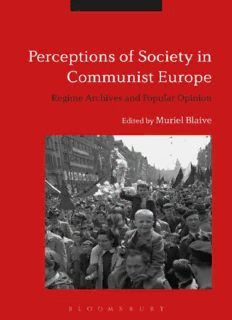
Perceptions of Society in Communist Europe: Regime Archives and Popular Opinion PDF
Preview Perceptions of Society in Communist Europe: Regime Archives and Popular Opinion
Perceptions of Society in Communist Europe Also available from Bloomsbury The Holocaust in Eastern Europe: At the Epicenter of the Final Solution, by Waitman Wade Beorn Hungarian Women’s Activism in the Wake of the First World War: From Rights to Revanche, by Judith Szapor Perceptions of Society in Communist Europe Regime Archives and Popular Opinion Edited by Muriel Blaive To my elder son, C., who was born when this project took roots and is now an adult. M.B. Contents Contributors Acknowledgements Introduction Muriel Blaive Part 1 From Post-War to Stalinism 1 Secret Agents: Reassessing the Agency of Radio Listeners in Czechoslovakia (1945–1953) Rosamund Johnston 2 Practices of Distance and Perceptions of Proximity: Trade Union Delegates and Everyday Politics in Post-Second World War Romania Adrian Grama 3 A Case Study of Power Practices: The Czechoslovak Stalinist Elite at the Regional Level (1948–1951) Marián Lóži 4 Policing the Police: The ‘Instructor Group’ and the Stalinization of the Czechoslovak Secret Police (1948–1951) Molly Pucci Part 2 From Stalinism to Real Existing Socialism 5 Constructive Complaints and Socialist Subversion in Stalinist Czechoslovakia: E.F. Burian’s Scandal in the Picture Gallery Shawn Clybor 6 Perceptions of Society in Czechoslovak Secret Police Archives: How a ‘Czechoslovak 1956’ was Thwarted Muriel Blaive 7 Crises and the Creation of Institutions for Assessing Popular Consumption Preferences in Communist Bulgaria (1953–1970) Martin K. Dimitrov 8 Who Is Afraid of Whom? The Case of the ‘Loyal Dissidents’ in the German Democratic Republic Sonia Combe Part 3 From Real Existing Socialism to the End – and Beyond 9 Did Communist Children’s Television Communicate Universal Values? Representing Borders in the Polish Series Four Tank-Men and a Dog Machteld Venken 10 Between Censorship and Scholarship: The Editorial Board of the Czechoslovak Academy of Sciences (1969–1989) Libora Oates-Indruchová 11 ‘How Many Days Have the Comrades’ Wives Spent in a Queue?’ Appealing to the Ceauşescus in Late-Socialist Romania Jill Massino 12 Authenticating the Past: Archives, Secret Police and Heroism in Contemporary Czech Representations of Socialism Veronika Pehe Bibliography Index Contributors Muriel Blaive is Advisor to the Director for Research and Methodology at the Institute for the Study of Totalitarian Regimes in Prague. She is a sociopolitical and oral historian of communist and post-communist Czechoslovakia/the Czech Republic, placed in its Central European context. Shawn Clybor received his PhD from Northwestern University. He is currently a history teacher at Dwight-Englewood School in New Jersey and manages a private collection of Czech avant-garde books and art in New York City. He has published on the political activism of the Czech avant-garde, 1920–1960. Sonia Combe is Emeritus Research Associate at Centre Marc Bloch in Berlin. Her research interests focus on intellectuals in the former GDR and communist Europe, as well as the concentration camp experience under Nazism. Martin K. Dimitrov is Associate Professor of Political Science at Tulane University in New Orleans. His research interests focus on the origins, evolution and demise of authoritarian regimes. Adrian Grama is Postdoctoral Fellow at the Graduate School for East and Southeast European Studies, University of Regensburg, Germany, where he works on questions of social, economic and labour history in twentieth-century Eastern Europe. Rosamund Johnston is a graduate student of Modern European History at New York University. Her research interests include sound studies, the history of broadcasting, migration and propaganda. Marián Lóži is Researcher at the Institute for the Study of Totalitarian Regimes in Prague. He is also enrolled in the doctoral programme at the Institute of Economic and Social History at the Faculty of Arts, Charles University. His main area of interest is the history of the Communist Party of Czechoslovakia in the 1950s. Jill Massino is Associate Professor of Modern European History at UNC Charlotte. She is co-editor (with Shana Penn) of Gender Politics and Everyday Life in State Socialist Eastern and Central Europe (Palgrave, 2009) and author of Ambiguous Transitions: Gender, the State, and Everyday Life in Socialist and Postsocialist Romania (Berghahn Books, 2018). Libora Oates-Indruchová is Professor of Sociology of Gender at the University of Graz in Austria. Her research interests include censorship, cultural representations of gender in state socialism and post-socialism, gender and social change and narrative research. Veronika Pehe is Marie Curie Fellow at the Institute of Contemporary History, Czech Academy of Sciences. Her work focuses on cultural memory, memory politics and the history of the economic transformation in East-Central Europe. Molly Pucci is Assistant Professor of Twentieth-Century European History at Trinity College Dublin. She studies the history of communism, legal history and the history of policing in twentieth-century Europe. Machteld Venken currently holds an Elise Richter Fellowship at the Institute of Eastern European History, University of Vienna. She studies European history, migration, border regions and children.
Description: